Chatbots are transforming education. These AI-powered programs chat with students to teach, test, support, and guide learning journeys.
From middle school to university, chatbots are making an impact – serving as personalized tutors, homework helpers, counselors, and more.
Just think about having your own private tutor anytime, anywhere. That's what education chatbots can provide.
By understanding each student's strengths, weaknesses, and learning styles, they create customized lessons to help us thrive.
We'll uncover the capabilities and benefits chatbots bring to the classroom, from enhancing student engagement to streamlining admin tasks for teachers.
Join us on an insightful tour of this exciting innovation in education. You'll discover real-world examples of chatbot-boosting outcomes.
And learn how these virtual assistants are shaping the future of learning for students of all ages.
So let's dive into the world of education chatbots by knowing what they are!
What Are Education Chatbots?
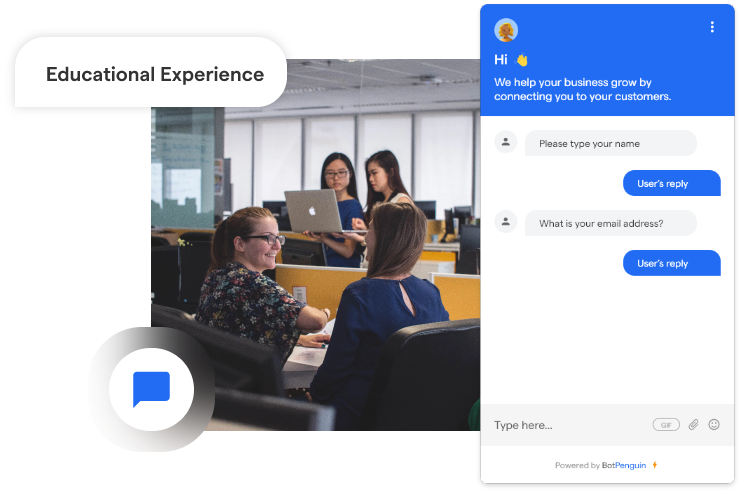
Education chatbots are computer programs that use artificial intelligence to interact with students or educators.
Chatbots for education purposes are designed to simulate human conversations to provide useful information to students at any given time.
These chatbots have evolved from simple, scripted bots to intelligent, flexible bots that can understand natural language and respond accordingly.
Chatbots in the education system can help students in various ways, from answering questions and providing support to creating personalized learning experiences. We will cover all the applications in our next section.
Applications of Education Chatbots: Enhancing the Learning Experience

Education is a dynamic field that constantly embraces new technologies to improve the learning experience.
Among the latest innovations, education chatbots have become as valuable tools in enhancing student engagement, providing personalized learning experiences, supporting administrative tasks, assisting in career guidance and counseling facilitating language learning, and inclusivity in education.
In this part, we will explore these applications and their impact on the education system.
Enhancing Student Engagement
Engaging students in the learning process is crucial for their success.
Education chatbots play a significant role in this area by creating interactive and immersive experiences.
Chatbots in the education system can ask questions, initiate discussions, and provide real-time feedback to keep students actively involved.
By making learning fun and interactive, chatbots stimulate student participation and foster a deeper understanding of the subject matter.
For Example:
One popular example is "QuizzBot," a chatbot that presents short quizzes to students at regular intervals during a lesson.
The bot not only tests their knowledge but also provides explanations for correct answers and suggests areas for improvement.
This gamified approach keeps students engaged and motivated to learn.
Providing Personalized Learning Experiences
Every student learns differently, and catering to individual needs can challenge educators.
Education chatbots use artificial intelligence and machine learning to deliver personalized learning experiences.
They can analyze student data, track progress, and adapt content to match each student's learning style, preferences, and pace. By tailoring lessons to their specific needs, chatbots can effectively enhance learning outcomes.
For Example:
"LearnMate" is a chatbot that employs personalized learning techniques.
It identifies the strengths and weaknesses of students and generates customized study plans with targeted resources and exercises.
By focusing on each student's unique requirements, it maximizes their learning potential.
Supporting Administrative Tasks
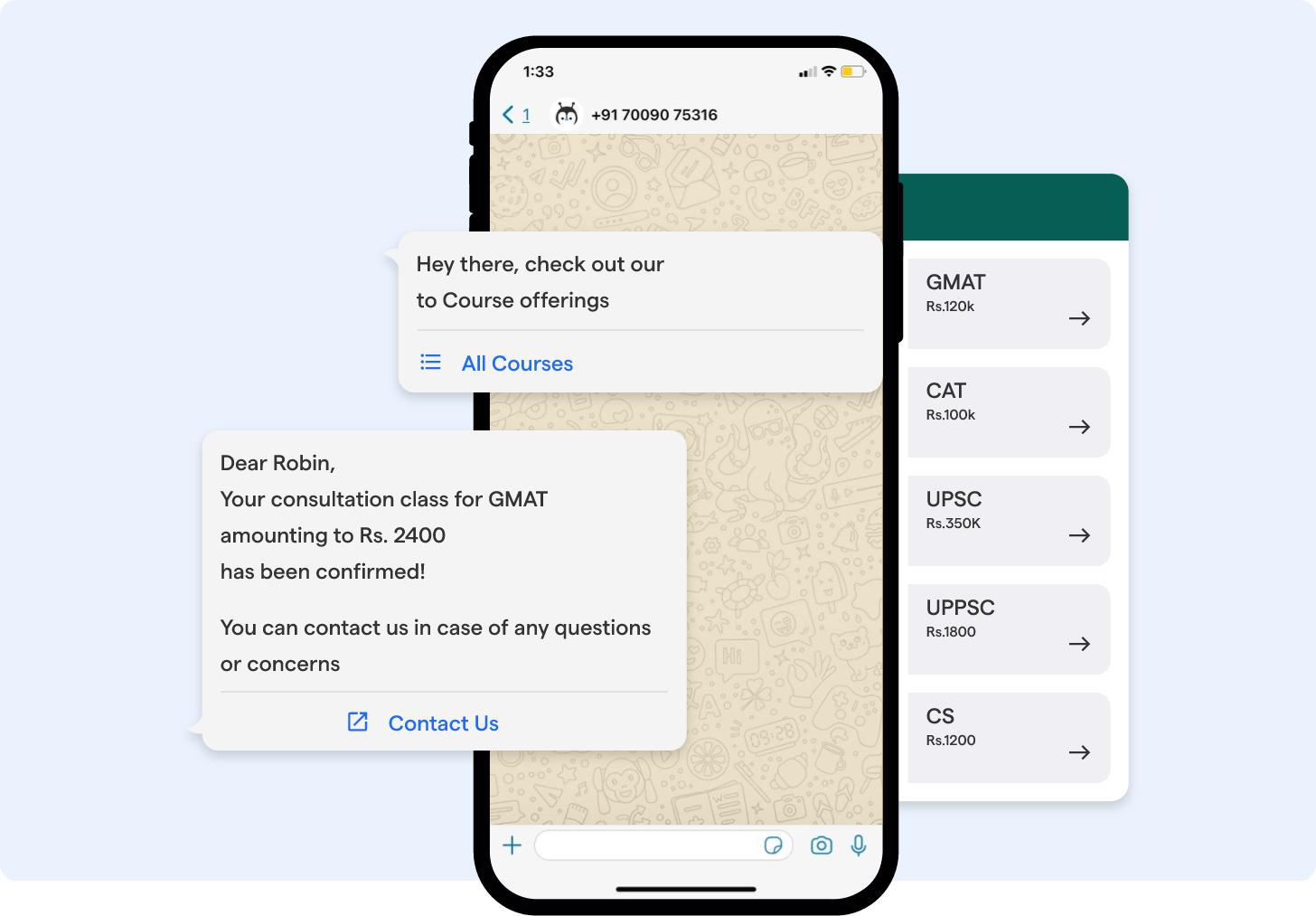
Managing administrative tasks is a time-consuming aspect of the education system.
Education chatbots assist educators and administrators by automating routine administrative tasks.
Chatbots in the education system can handle functions such as attendance tracking, scheduling, sending notifications, and managing course materials.
By streamlining administrative processes, chatbots free up time for educators to focus on teaching.
For Example:
"AdminBot" is an example of a chatbot designed to handle administrative tasks.
It can generate class schedules, send reminders for upcoming deadlines, and even provide real-time updates on class cancellations or room changes.
This efficient and reliable system ensures seamless administrative operations.
Assisting in Career Guidance and Counseling
Choosing a career path can be overwhelming for students. Education chatbots offer valuable support in career guidance and counseling.
They provide information about various career options, course requirements, and job market trends and even offer mock interviews and resume-building tips.
By delivering personalized guidance, chatbots help students make informed decisions about their future.
For Example:
"CareerCoach" is a chatbot that assists students in career planning.
It asks students about their interests, skills, and aspirations and provides tailored career recommendations based on their responses.
The chatbots in education also offer resources such as articles, videos, and success stories to inspire and guide students in their career journey.
Suggested Reading:
Why Chatbots are the #1 tool to grow your education business
Facilitating Language Learning
Language learning can be challenging, but education chatbots make it more accessible and engaging.
They can simulate conversations, provide vocabulary practice, offer instant language translation, and even assess speaking and writing skills.
By providing an immersive language learning experience, chatbots help students develop proficiency at their own pace.
For Example:
"LingoBot" is a language-learning chatbot that engages students in conversations, offers grammar exercises, and provides real-time corrections.
Through personalized language learning activities, LingoBot supports students in mastering new languages effectively.
As we have covered 5 applications of chatbots in the education system, Now, we will look at the advantages of having a chatbot in the education sector.
Advantages of Education Chatbots
The world is rapidly changing, and with technological advancements in every sector, education is no exception.
Chatbots have grown as valuable tools in the education sector, providing a wide range of benefits.
In this section, we will explore some advantages of educational chatbots.
24/7 Availability and Instant Support
Unlike human teachers or administrators, education chatbots are available 24/7.
Chatbots in the education system can provide instant support to students, making learning more accessible and convenient.
Students can interact with chatbots at any time of the day or night to find the answers they need.
For example: Imagine a student studying for an exam at midnight and stuck on a difficult concept.
A chatbot can provide instant support and help the student understand the concept without waiting for their teacher to be available the next day.
And taking your first step towards automation isn't that tough. Meet BotPenguin- the home of chatbot solutions.
With all the heavy work of chatbot development already done for you, deploy chatbots for multiple platforms and make multi-channel support look easy for business:
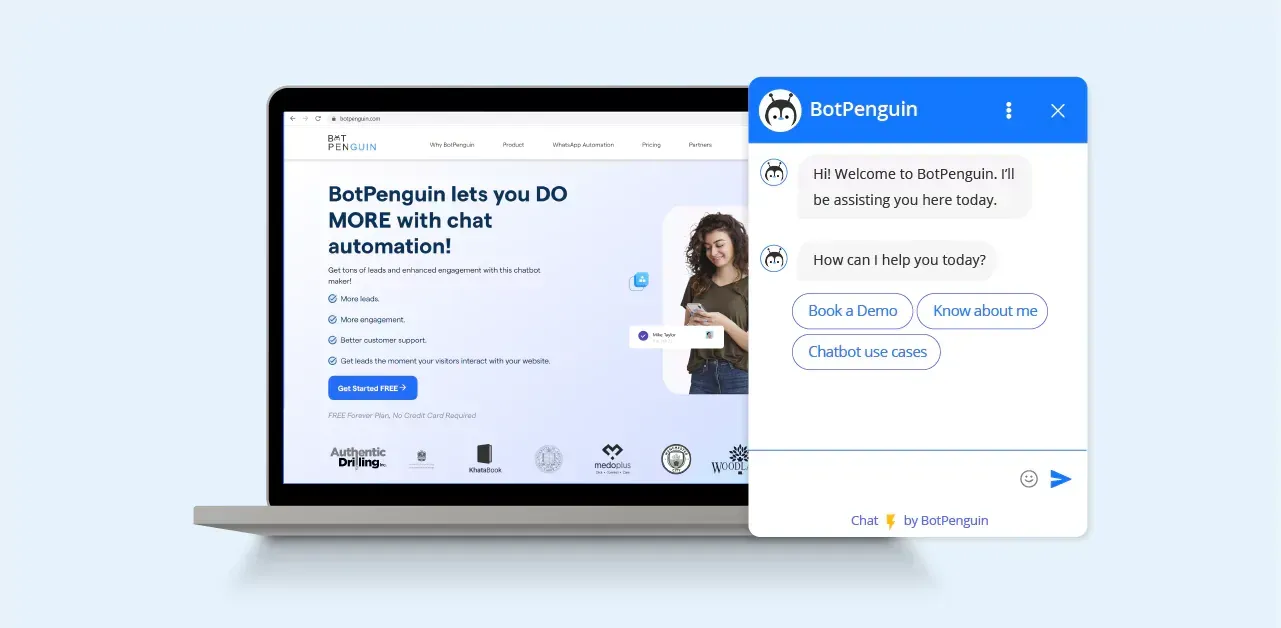
Scalability and Cost-Effectiveness
One of the biggest advantages of education chatbots is their scalability and cost-effectiveness.
They can serve a large number of students simultaneously without the need for additional infrastructure or staffing.
As a result, they are more cost-effective compared to traditional teaching methods.
For Example:
Schools can use chatbots to reduce staffing requirements for administrative tasks such as grading assignments.
This saves time and resources, and allows teachers to focus on higher-value tasks such as teaching and mentoring students.
Data-Driven Insights for Personalized Learning
Education chatbots accumulate data on individual student performance and leverage it to provide personalized learning experiences.
They can analyze learning patterns, provide targeted resources to support students and adjust lessons to accommodate individual learning styles.
For Example:
An education chatbot uses collected data to detect a student's weaknesses in a particular subject and recommend additional learning resources to help them improve.
This creates a more targeted approach to learning and supports student success.
Suggested Reading:
Enhanced Student-Teacher Interaction
Interaction between students and teachers is essential to the learning process.
Education chatbots can facilitate this interaction by providing a platform for students to ask questions and engage with their teachers in real-time.
They can also assist with grading assignments and offer feedback to students.
For Example:
A teacher can use a chatbot to provide instant feedback on an assignment and guide students to improve their work. This creates a more engaging and interactive learning experience for students.
Improved Administrative Efficiency
Education chatbots can simplify administrative tasks such as scheduling and organizing course materials.
This saves time and money for schools and allows administrators to focus on other critical tasks.
For Example:
A chatbot can manage student timetables, schedules, and class cancellations. This eliminates the need for manual data entry, freeing up administrative time for higher-value tasks.
Customizable and Adaptable to Different Learning Styles
Every student is unique and learns differently.
Education chatbots can be customized and adapted to different learning styles, ensuring that every student has access to relevant and effective learning resources.
For Example:
A chatbot can adjust the pace of a lesson based on individual student preferences, ensuring that every student can learn at their own pace. This creates a more inclusive and personalized learning experience for all students.
After looking into applications and advantages of education chatbots, we must explore some of the best examples of education chatbots, so why wait to scroll down?
Examples of Education Chatbots
Education chatbots have become increasingly popular in recent years due to their ability to provide convenient and personalized learning experiences.
Here are some examples of education chatbots that are transforming the way students learn.
Duolingo Chatbot
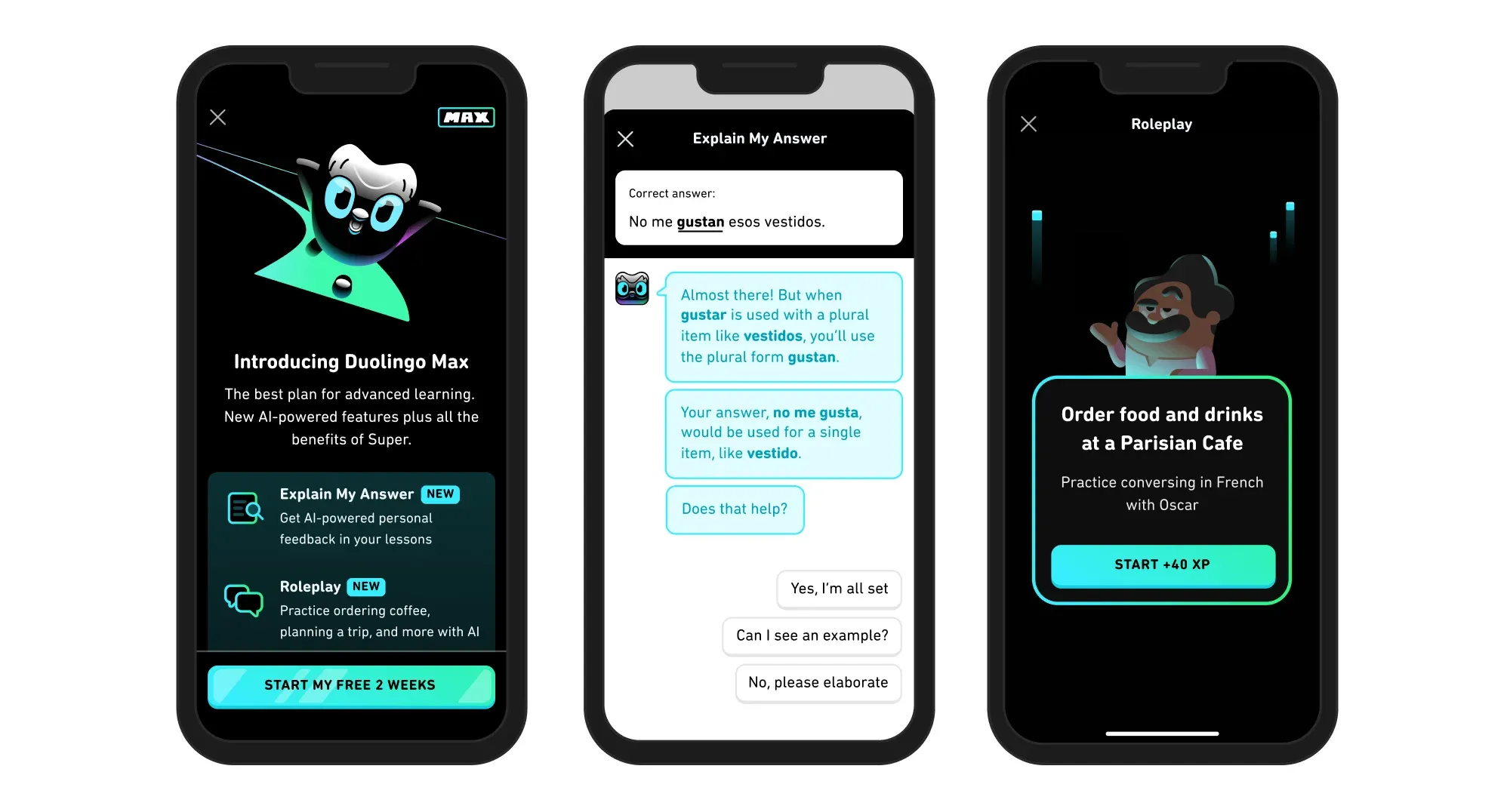
Duolingo is a language-learning platform that uses gamification techniques to make learning fun.
It also has a chatbot feature that allows students to practice speaking and listening skills in real-time.
The chatbot engages in conversation with the student, providing them with feedback on their pronunciation and grammar.
For Example:
If a student is learning French, they can use the Duolingo chatbot to practice conversation in French.
The chatbot will help them to improve their pronunciation and grammar as they engage in conversation with it.
Suggested Reading:
Brainly
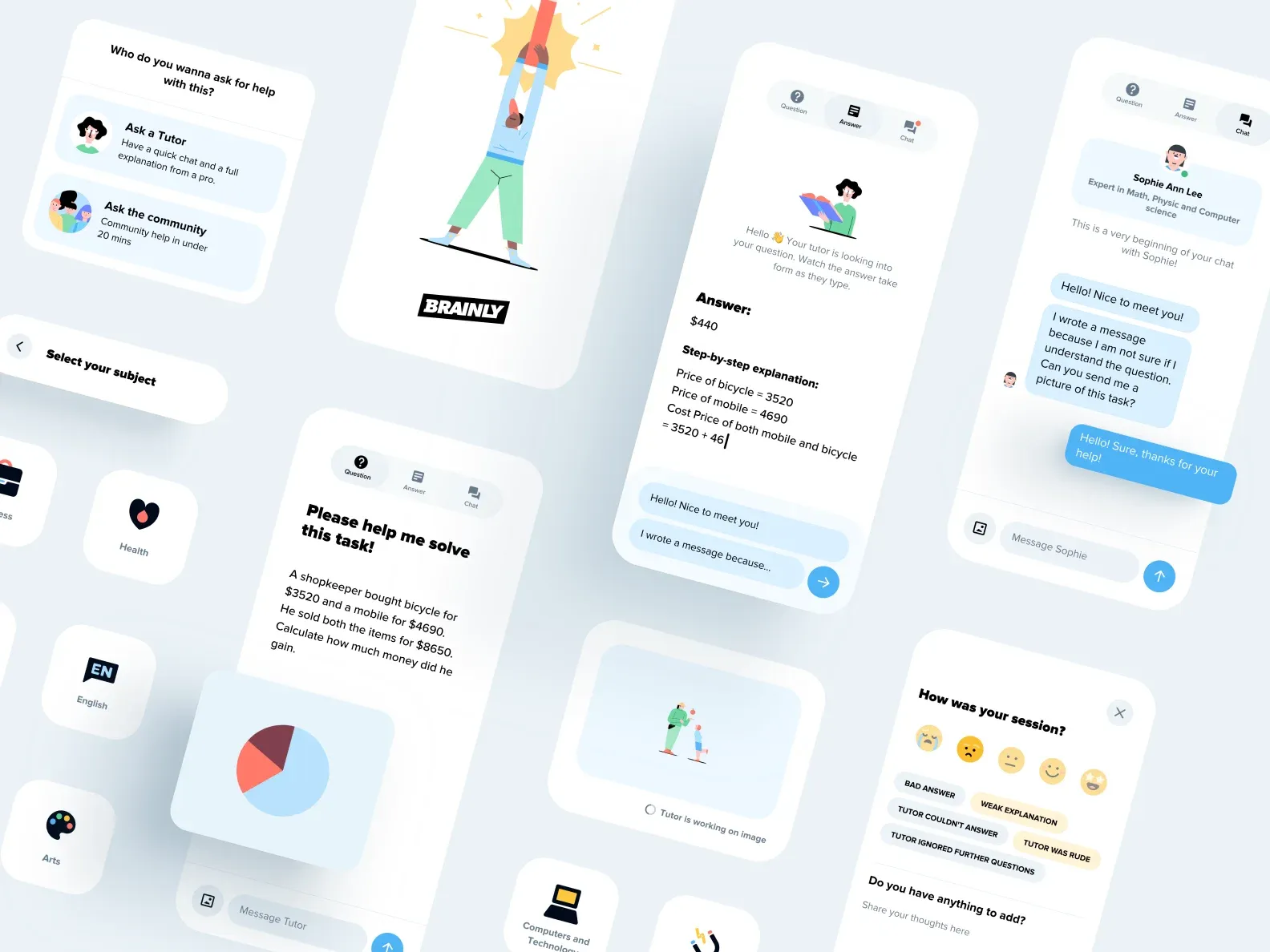
Brainly is a chatbot that specializes in homework help. It allows students to post questions and then matches them with subject matter experts who can provide answers and explanations.
Brainly chatbot is equipped with a vast database of frequently asked questions, making it easy for students to find help on a wide range of topics.
For Example:
A student who is struggling with a math problem can use the Brainly chatbot to ask for help, and the chatbot will connect them with a math expert who can provide a detailed explanation. This allows students to get the help they need without meeting their teachers in person.
Future of Education Chatbots
Education chatbots have already made a significant impact on the way students learn and teachers teach.
However, their potential goes far beyond what we see today.
In this section, we will explore the future of education chatbots, including emerging trends and advancements, potential challenges, and their overall impact on the future of education.
Emerging Trends and Advancements
In the future, education chatbots will become more customizable and adaptable to individual student needs.
By gathering data on learning patterns and preferences to provide personalized suggestions, resources, and feedback to help students learn at their own pace and in a way that suits their learning style.
As AR and VR technologies evolve, education chatbots will likely incorporate these technologies to provide immersive learning experiences through virtual science experiments, historical reenactments, and other activities guided by chatbots to make learning more interactive, engaging, and memorable.
Advancements in natural language processing and emotional intelligence will allow education chatbots to have more natural and human-like conversations by understanding complex questions, emotions, and nuances to create a more personalized and empathetic learning experience.
This will help chatbots become even better companions and mentors to students.
Potential Challenges and Solutions
One of the main challenges of using education chatbots is ensuring the privacy and security of student data.
As chatbots collect and analyze personal information, it becomes crucial to establish robust privacy policies, secure data storage practices, and strong encryption methods.
Educators and developers must work together to prioritize student privacy and comply with data protection regulations.
Education chatbots rely on algorithms and machine learning to analyze data and make decisions.
However, there is a risk of reinforcing biases or perpetuating stereotypes if the algorithms are not carefully designed and monitored. It is essential to have ethical guidelines and diverse teams of developers who actively work to identify and correct any biases in chatbot behavior.
Impact on the Future of Education
Education chatbots will revolutionize personalized learning by providing tailored resources, feedback, and support to each student.
By using AI and analyzing vast amounts of data, chatbots can understand the unique needs and strengths of individual students, assisting them in achieving their full potential.
This personalized approach will lead to improved learning outcomes and increased student engagement.
Increased Access to Education
Chatbots have the potential to bridge the gap in access to education. In remote areas or underserved communities, where qualified teachers may be scarce, chatbots can provide educational content and support to students who would otherwise have limited resources. This increased access to education will empower more individuals to pursue their academic goals and contribute to society.
Collaboration and Lifelong Learning
Education chatbots can facilitate collaboration and lifelong learning. These chatbots can connect students with experts and peers from all around the world, creating a global learning community. Moreover, as the job market evolves, chatbots can also assist adults in upskilling and reskilling, ensuring that individuals can adapt to changing demands and continue learning throughout their lives.
How BotPenguin’s Education Chatbot is Making Student Life Easier?
Every student knows how hectic university life can get - between classes, assignments, exams, activities, and more, there's barely enough time in the day!
But what if you had a helpful friend at your fingertips 24/7 who could answer all your questions, take tasks off your plate, and even get to know you on a personal level?
Say hello to BotPenguin’s Education Chatbot, the chatbot changing the game for higher ed! This clever bot has all the perks of a trusty friend with none of the human limitations.
Need info on admissions? BotPenguin’s Education Chatbot got you covered. Need a reminder for that big deadline? Just ask your new friend BotPenguin.
With features like personalized guidance, automated tasks, messaging integrations, and around-the-clock support, BotPenguin’s Education Chatbot is like the ultimate student assistant.
Universities using this chatbot are seeing big impacts too - from streamlined operations to deeper student insights.
So forget all-nighters in the library. With BotPenguin’s Education Chatbot by your side as your go-to campus companion, student life just got a whole lot easier. Say hi to your new friend BotPenguin today!
Suggested Reading:
Frequently Asked Questions (FAQs)
What are the advantages of educational chatbots?
Educational chatbots offer personalized learning experiences, aid in immediate query resolution, and provide 24/7 accessibility. They adapt to individual learning styles, offer instant feedback, and enhance engagement through interactive teaching methods.
What are the disadvantages of chatbots in education?
Chatbots for education may lack emotional intelligence, limiting their ability to understand complex emotions or nuanced queries. Additionally, technical glitches or dependency on connectivity might hinder the learning process, leading to reliance on automated responses.
How do chatbots affect higher education?
In higher education, chatbots for education streamline administrative tasks, handle student inquiries, and provide supplementary resources. They assist in course selection, offer guidance on academic pathways, and contribute to a more personalized learning environment for students pursuing advanced studies.
Are education chatbots cost-effective for institutions?
Yes, they reduce operational costs by handling routine queries, grading assessments, and optimizing resource allocation, making education more efficient and accessible.
Are education chatbots suitable for all age groups?
Yes, chatbots can adapt content and interactions to suit various age groups, from elementary school to higher education and lifelong learning.



